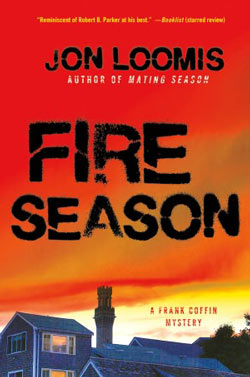
Until a replacement can be found, Frank Coffin is pulling double duty as a detective and interim police chief for the Provincetown, Massachusetts, police force. Luckily, the off-season has just started for this tourist town, and Frank hopes the quiet streets will allow him more time to stay at home and take care of his very pregnant girlfriend.
When Frank responds to a call about—of all things—the murder of some local seals, and immediately afterward has to investigate a Dumpster fire, he starts losing hope that this off-season will provide any downtime at all. As several more increasingly large and dangerous fires are sparked in quick succession, it seems there’s a firebug on the loose. Finding a way to catch a man who burns all evidence of his crimes would give Frank enough to worry about, but with his deputy terrified that UFOs are real, a severed head found floating in a local bar’s lobster tank, his mother setting fires of her own, and a girlfriend with bizarre midnight cravings, Frank is up to his eyeballs in the criminal machinations and colorful antics of P’town’s eccentric residents.
It’s not often that you find a solid police procedural couched in dialog that makes you laugh out loud every few pages, but Fire Season by Jon Loomis is just that. Loomis leavens the criminal—and sometimes tragic—events he writes of with snappy patter and the occasional dose of absurdity.
A less accomplished writer might be seeming to undermine the seriousness of the subject at hand: rampant death and destruction are no laughing matter, after all. Loomis, however, juxtaposes the dramatic with the humorous in a way that serves to enhance each. His deliberate, and masterful, use of this technique is a neat reminder that even in the most dire of situations, a little humor can help anchor us in the long view. When used in a crime novel, it’s a nice nod to the fact that this technique is also a coping mechanism not unfamiliar to police officers and others in similarly stressful occupations.
And while the crimes—beginning with the grisly slaughter of seals in captivity, and escalating to multiple arsons, a murder, and international drug trafficking—are depicted with the gravity each deserves, the human relationships are usually laced with levity and warmth, such as between the protagonist, Acting Police Chief Frank Coffin, and his partner, Sergeant Lola Winters:
“Are you thinking what I’m thinking?” Lola said, after they’d found five hollow ducks.
“I’m thinking I wish we had a drug dog,” Coffin said.
“So, smuggling?”
Coffin nodded. “Not a lot of volume, so something pricey—high quality heroin or coke, maybe.”
“Could be some other smuggling thing,” Lola said. “Diamonds. Krugerrands.”
“And any minute now Cary Grant could jump in through the window,” Coffin said.
Lola punched him in the shoulder.
The humor does get more broad toward the end, when readers familiar with the series will cheer the return of Coffin’s Uncle Rudy, who commandeers an entire subplot to great comedic effect. In fact, almost all of the characters, whether new or returning, are drawn with such lively strokes that it’s hard not to feel a fondness for these fictional inhabitants of the actual Massachusetts town where the series is set. Loomis’s love for the place and the surrounding area is palpable, particularly in passages such as these:
Coffin had driven the stretch of highway between Provincetown and Eastham two or three times a week for most of his adult life, and he always felt the same tug of nostalgia as he passed North Truro, the same surge of elation on the way back, cresting the ridge at Pilgrim Heights and looking northeast at the long curve of Provincetown, the sweep of tawny beach, the waterfront with its crowd of white buildings, the Pilgrim Monument looming over everything, casting its long shadow.
Loomis also skillfully depicts the effects of a dying fishing trade on the towns of the Massachusetts coast, and the measures undertaken in order to keep these towns alive. For all the hilarity that laces the book, Frank Coffin is often called on to consider the serious matters of aging and trying to raise a young family in a small town that is so strapped for cash, it can only afford volunteer firefighters—a serious problem when there’s a serial arsonist on the loose.
The ending acknowledges how hard it can be to keep the wheels of government turning when there just isn’t enough money for public services. It would make for glum reading if Loomis wasn’t so good at balancing the serious with the light-hearted, rendering his social commentary much easier to absorb.
I don’t believe I’ve ever read a crime novel that tackles such serious issues while still managing to be incredibly funny: other books have tried, but been unsuccessful at either one or the other, in my opinion. Fire Season, however, is both a good mystery novel and a witty look at real concerns affecting modern life and everyday people.
Doreen Sheridan is a freelance writer living in Washington, D.C. She
microblogs on Twitter @dvaleris.

Very good points you wrote here..Great stuff…I think you’ve made some truly interesting points.Keep up the good work.
Illustrative things in this book to know but there are also very interesting and well-authorized CIPD Assignment Writers available in the markets thesedays to help you out in your assessment days reliably.